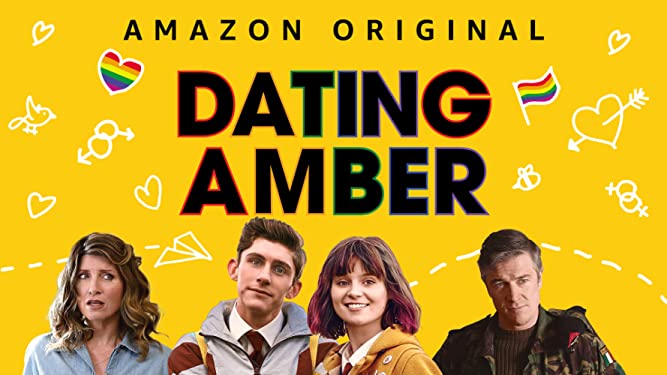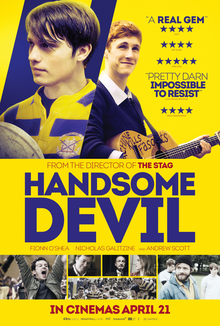An engaging but ultimately flawed twink flick that reinforces the idea that you can only be openly gay in the big city, rather than remaining in the provincial community in which you grew up.
Dating Amber – Amazon Prime’s latest LGBT+ offering to coincide with Pride season. And it’s a cute film, if you’re into soft and gentle twinks being goofy and finding themselves in a sea of prejudice and misunderstanding.
Irish actor Fionn O’Shea is undoubtedly the star here. We’ve seen him before in Handsome Devil (2016), where he played a similarly confused twink alongside the beautiful Nicholas Galitzine. The only difference is that Eddie in Dating Amber is a more rounded and complicated individual than Ned Roche in Handsome Devil, who spends most of the film crushing over his rugby twunk dorm mate, Connor.
In all fairness though, Dating Amber is about two closeted teenagers, not just one. Lola Petticrew gives a strong performance as Amber—a frustrated but determined closeted lesbian who runs a side business renting out one of her mother’s caravans for schoolmates to have romantic liaisons.
Side by side, Amber and Eddie struggle with their sexuality in a hostile school environment and if it weren’t for the fact that both actors are so engaging, this plot premise would make a predictable film into a very predictable and frankly dull-as-ditchwater one.
But somehow O’Shea and Petticrew manage to pull through as their characters start dating one another as a ruse to throw off the incessant crowing from their homophobic classmates.
Trips to Dublin, late-night drug-fuelled escapades, and lies lies lies follow as these two try to convince everyone else, including themselves, that they’re straight.
Eventually, of course, the truth comes out, and Eddie ultimately finds his way. To London, in fact, where the promise of a fulfilling life for this ‘baby gay’ beams into Eddie’s sunny face.
A predictable outcome
What I wanted, though, was a less predictable and ultimately less deceiving ending. We’ve seen it before. A provincial gay boy who is closeted because of his misunderstanding community and family can only find freedom by escaping to the big metropolis.
The consequence of this is that as viewers, and as gay people, in particular, we internalise the assumption that rural, provincial communities are no place for ‘an out gay man’, as Little Britain’s Daffyd Thomas (Only gay in the village) used to tell us repeatedly.
Now, I grew up in a provincial rural village, admittedly in the 2000s, a decade later than this film is set. But, while there weren’t nuns on every street corner signing themselves each time they saw the local bum boy walk into the Co-op, it wasn’t easy. Rural communities tend to be built around heterosexual families and their needs, and there is intense pressure to follow suit. And I felt it.
I went off to university, to the great metropoli of Exeter, Leeds, and Leicester, but have I been any more fulfilled? There are opportunities that big cities present to LGBTQ people which are undeniably advantageous and, ideally, it doesn’t have to be either / or.
Yet Dating Amber makes it precisely into an either/or decision. Either you stay here and this place will kill you, as Amber explains to Eddie, or you go out there, to the big city, and find yourself and be happy.
The result is that rural communities are drained of the kind of social diversity that makes for more tolerant neighbourhoods, and being gay itself becomes synonymous with a kind of metropolitan and urban lifestyle that those of us who are more rural at heart find hard to bear.
What we need, then, are LGBTQ films, like God’s Country, that wrestle hard with the realities of being ‘the only gay in the village’, and where communities themselves go through a process of slow adaptation so that they become welcoming places for all sorts of people.




